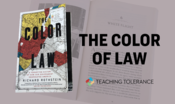lesson
Mass Incarceration as a Form of Racialized Social Control
What is the “new Jim Crow”? Throughout its history, the United States has been structured by a racial caste system. From slavery to Jim Crow to mass incarceration, these forms of racialized social control reinvented themselves to meet the needs of the dominant social class according to the constraints of each era.
October 13, 2014

